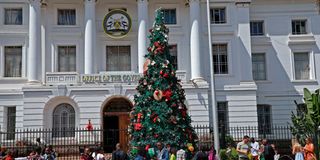Developing story: Iranian President Ebrahim Raisi confirmed dead in chopper crash
Scrooge's transformation: A Kenyan Christmas tale in tough economic times

City residents take pictures of the Christmas tree outside City Hall in Nairobi on December 26, 2022.
“‘A merry Christmas, uncle! God save you!’ cried a cheerful voice. It was the voice of Scrooge’s nephew, who came upon him so quickly that this was the first intimation he had of his approach. ‘Bah!’ said Scrooge. ‘Humbug!’ He had so heated himself with rapid walking in the fog and frost, this nephew of Scrooge’s, that he was all in a glow; his face was ruddy and handsome; his eyes sparkled, and his breath smoked again. ‘Christmas a humbug, uncle!’ said Scrooge’s nephew. ‘You don’t mean that, I am sure?’ ‘I do,’ said Scrooge. ‘Merry Christmas! What right have you to be merry? What reason have you to be merry? You’re poor enough.’ ‘Come, then,’ returned the nephew happily. ‘What right have you to be dismal? What reason have you to be morose? You’re rich enough’”.
These words are off Charles Dickens’ most famous novella, A Christmas Carol. Ebenezer Scrooge was an old miser who found no cheer in anything. He was rich and miserable. In this passage, his young nephew (who barely has any material possessions) excitedly wishes him “a merry Christmas!” Scrooge asks, “What right have you to be merry?” That’s a question Scrooge could have asked any Kenyan.
What right has any Kenyan to be merry when the economy is seemingly tanking and the price of living skyrocketing? And with all this, the gap between the rich and poor widening. What’s there to celebrate? In Nairobi and other major cities, during the Christmas season and new year celebrations, those who can afford flock various entertainment spots.
There will be smoky-salty scents filling the air as the swing doors bang; the coffee machines hiss and gurgle, occasionally interrupted by the screeching of the coffee grinder. The sun sometimes hits the tiles with a pallid hue through the small windowpanes of cafés, cosy enclaves in the middle of the town’s Central Business District (CBD).
Young people wade through these places lost in distant perfumes, snug hugs and constant photographs for Instagram and Tiktok posts. They go through the parties, the frenzied dancing in the clubs, between the drinks, shallow conversations, faces aglow in the luminescence of many fluorescent lights that crash into one another like watercolour waves — the youngsters probably feeling alone in the emptiness of a crowded place amidst the guttural shouts of ecstasy, their voices gooey slurs, marinated in distilled degeneracy and the music cranked up to ear-splitting levels in the chaos and noise of movement; a reckoning of pace, of balance, and the pulse of the city.
On the other side of Nairobi are the poor who can’t afford anything for the holidays. Most are casual labourers that are paid daily and now with factories closed for the holiday, even finding food is a problem. Some of them live in a string of tiny rooms with badly-damaged iron sheets for roofs and paper-thin walls, people living in squalor in the solitude of those rooms. As they sleep on empty stomachs, a woolly, dull kind of melancholy settles thickly over their ringing nerves, shifting their weight in the darkness. The silence intensifies until it is no longer a lack of noise, but an atmosphere so thick and stifling one can taste it. Then relief comes as they drift to sleep; dropping down from the heights of worry, they plateau, and, eventually, lose themselves in sleep, forgetting their hunger pangs for a moment.
In most Kenyan villages this December, the air is damp with the smell of just-rained-on ground, the trees blooming, and the branches starting to warble and swoop with murderous intent — a double act that represents the African wild: its beauty only offered in the context of the danger of falling tree branches.
In A Christmas Carol, Dickens paints these two worlds — of those who can afford to celebrate Christmas and those who cannot. Dickens uses the character Scrooge to illustrate how rich, self-centred, insensitive people can be converted to become generous and socially conscious individuals. As the novella progresses, it becomes more cheerful — a heartfelt tale of wonder that inspires the Christmas spirit in the whole community. Scrooge is transformed after being visited by the Ghosts of Christmas Past, Present and Future that offer him a chance of redemption from his greedy ways.
At the end of the novella, Scrooge becomes a philanthropist. And he is so impressed with his transformation that he says, “I am as light as a feather, I am as happy as an angel, I’m quite a baby”. Dickens reminds us that no matter our circumstances, we can make this a season of cheer. If we have food or other possessions to spare, we can spread the cheer by sharing with those who don’t have. And like Scrooge, we’ll discover that there is a lot of joy we experience when we help the less fortunate. And, as a country, there is much to be grateful for, no matter the situations we are facing. The December holidays give us a time to reflect and be grateful for all that is good. Despite everything, we have much to celebrate. A merry Christmas and a happy new year!
- The writer is a publisher based in Nairobi. [email protected]





